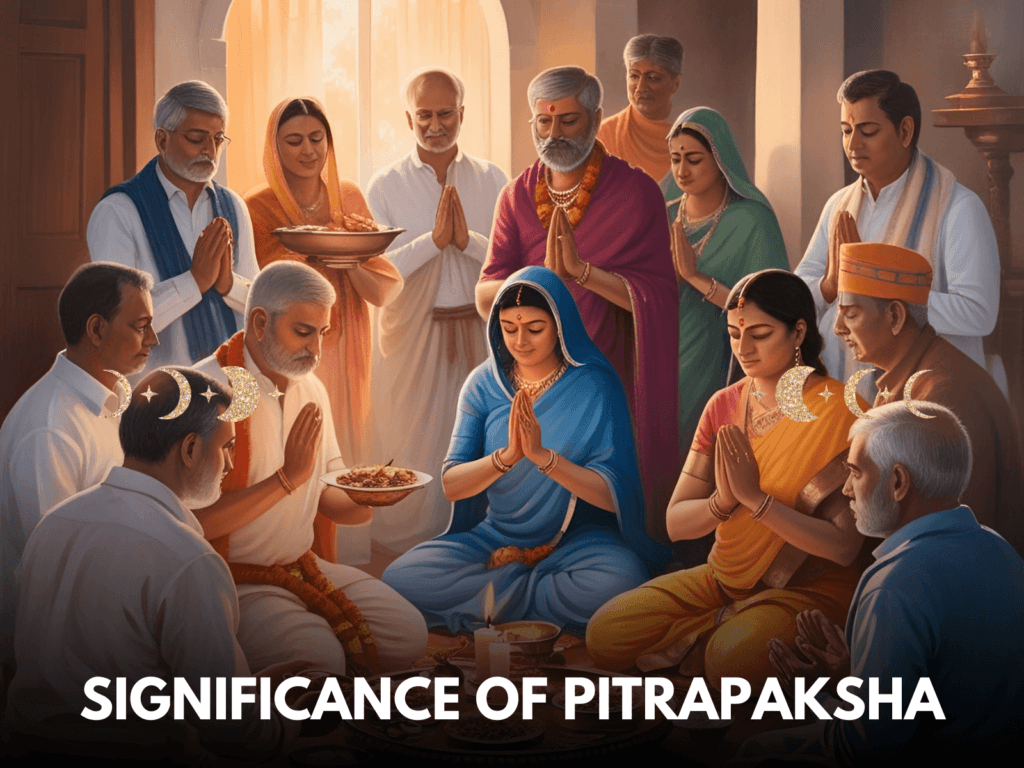
Pitra Paksha: A Sacred Opportunity to Heal Generational Pitra Dosha
April 17, 2025
Pitra Paksha: A Sacred Opportunity to Heal Generational Pitra Dosha
Introduction
Pitra Paksha is a deeply significant period dedicated to honoring our ancestors and seeking their blessings for peace, prosperity, and liberation from karmic debts. According to the Garuda Purana, Vishnu Dharma Shastra, and Vedic scriptures, the well-being of our Pitras directly influences the prosperity and health of their descendants. By offering Tarpan, Pinda Daan, and Daan, we not only uplift our ancestors but also cleanse ourselves and future generations from the burden of Pitra Dosha (ancestral karma).
As the Garuda Purana states:
“ये तु श्रद्धया युक्ताः पितॄणां तर्पणं कृताः।
तेषां कुलोद्भवाः सर्वे सुखं भुंजन्ति सन्ततम्॥”
“Those who sincerely perform Tarpan for their ancestors bring happiness and prosperity to their entire lineage.”
Understanding Pitra Dosha: The Impact of Neglecting Ancestral Duties
Pitra Dosha is a karmic imbalance in the horoscope caused by the unfulfilled desires, mistakes, or unperformed duties toward our ancestors. This dosha manifests when proper Shradh, Tarpan, or Pinda Daan has not been done for deceased forefathers, leading to blockages in various aspects of life such as:
- Financial instability and repeated losses
- Health issues, chronic illnesses, or hereditary diseases
- Delayed or troubled marriages
- Lack of progeny or troubled children
- Mental distress, depression, and frequent failures
- Unexplained hardships despite efforts
The Brihat Parashara Hora Shastra states that Pitra Dosha occurs when the Sun (significator of the soul and ancestors) is afflicted by Rahu, Ketu, or Saturn in the 9th house (house of Dharma and forefathers).
However, this powerful period of Pitra Paksha provides an opportunity to neutralize these karmic debts and receive divine blessings for a prosperous life.
Sacred Rituals to Remove Pitra Dosha & Ancestral Curses
Tarpan – Quenching the Spiritual Thirst of Pitras
Tarpan is the ritual of offering water mixed with black sesame seeds (Til), Kusha grass, and barley to ancestors. It helps in pacifying wandering spirits and providing them peace.
The Manu Smriti states:
“तस्मात्तु पितृकार्यं वै नित्यं कार्यं विवेकिनः।
पितृभिर्धार्यते नित्यं तर्पणं तेन मानवः॥”
“Performing Tarpan regularly ensures continuous blessings from ancestors.”
Pinda Daan – Freeing Ancestors from the Cycle of Rebirth
Pinda Daan is the act of offering cooked rice, sesame, honey, and cow’s milk as a sacred meal for the souls of the departed. It helps ancestors attain higher realms and spiritual progress, ultimately leading to Moksha.
This is especially recommended in Gaya, Haridwar, Prayagraj, Varanasi, and Rameswaram, where Lord Vishnu himself promised Pitra Mukti (ancestral liberation).
The Garuda Purana declares:
“गया श्राद्धं तु यः कुर्यात् स मुक्तो भवति सदा।”
“One who performs Pinda Daan in Gaya liberates not only their ancestors but also their entire lineage.”
Performing Shradh on Sarvapitri Amavasya
Mahalaya Amavasya (Sarvapitri Amavasya) is the most significant day of Pitra Paksha, when Shradh for all ancestors can be done—especially for those whose death dates are unknown. Offering food to Brahmins, cows, and the poor on this day is considered highly auspicious.
“पितृकार्यं सदा कर्तव्यं धर्मो हि परमो मतः।
तस्मात्पितॄणां संतोषं कुर्यात्सर्वं प्रयत्नतः॥”
“Fulfilling duties toward ancestors is the highest dharma; therefore, one must strive to satisfy them wholeheartedly.”
Pundalik Rishi: A Divine Lesson in Honoring Pitras
A remarkable story from the Bhakti tradition teaches us about the power of serving ancestors.
Pundalik Rishi was an ardent devotee of Lord Vitthal (Vishnu’s form in Pandharpur). However, his first and foremost duty was serving his aged parents with devotion.
When Lord Vishnu appeared to grant him Moksha, Pundalik, being engrossed in his duties, offered a brick for the Lord to stand on and requested Him to wait. Moved by his devotion to Pitras, Lord Vishnu remained standing, waiting for Pundalik to complete his service—thus earning the name Vithoba (Vitthal), meaning ‘the one standing on a brick’.
This story emphasizes that serving one’s ancestors and parents is equivalent to serving God. True spiritual elevation comes from fulfilling one’s dharma toward forefathers before seeking personal liberation.
As the Padma Purana states:
“पितृकार्यं तु यः कुर्यात्स नरो देवपूजनम्।
अन्ते च मोक्षमाप्नोति सत्यं सत्यं वदाम्यहम्॥”
“One who performs ancestral rites is as revered as one who worships the Divine and ultimately attains Moksha.”
Final Remedies to Overcome Pitra Dosha
If a person is suffering from generational curses or Pitra Dosha, they should perform the following during Pitra Paksha:
✅ Pinda Daan at Gaya or Haridwar for ultimate Moksha.
✅ Offer Jaal Daan (Til, Water, and Kusha) to ancestors daily.
✅ Feed Brahmins, the poor, and cows in the name of Pitras.
✅ Avoid non-vegetarian food, alcohol, onion, and garlic during this period.
✅ Offer water to a Banyan tree daily while remembering ancestors.
✅ Chant the Pitra Gayatri Mantra:
“ॐ सूर्यपुत्राय विद्महे, महायमाय धीमहि, तन्नो पितृ प्रचोदयात्॥”
“We meditate upon the divine energy of our ancestors. May they bless us with wisdom and spiritual strength.”
Conclusion: The Ultimate Liberation from Pitra Dosha
Pitra Paksha is not just a tradition—it is a powerful spiritual tool that allows us to heal generational karma, clear ancestral curses, and pave the way for prosperity, peace, and progress. Ignoring Pitra Karya (ancestral duties) leads to endless struggles, while fulfilling them brings divine grace and blessings.
As the Bhavishya Purana states:
“पितृभक्त्या तु ये तर्पयन्ति प्रेतान्स्वकीयान्सुताः।
तेषां कृते पितृदेवा आशीर्वादं प्रयच्छति॥”
“Those who offer Tarpan with devotion receive immeasurable blessings from their ancestors.”
Let us use this sacred time to honor our forefathers, heal our lineage, and invite abundance into our lives. May our ancestors bless us with peace, health, prosperity, and spiritual growth.
Om Pitribhyah Namah!
